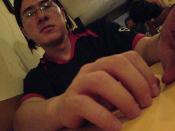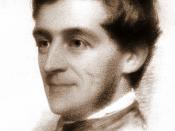The American Scholar
In his essay, "The American Scholar", Emerson portrays the scholar as one who learns from the influences of three main things: nature, books, and action. According to Emerson, a true scholar is one who relies upon his own intuition and "self-trust" rather than being a conforming victim of society that does not think and act for himself. In such cases, a man who does not follow these three categories in practice becomes a "parrot to other men's thinking" (1136), which to Emerson, is the greatest tragedy of all.
The first duty that a true scholar must learn and put into practice is the admiration and understanding of nature. One must ask himself, 'What is nature?' Comparable to the complex human mind, there is "never an end to the inexplicable continuity of this web of God, but always circular power returning into itself. Therein it resembles his own spirit, whose beginning, whose ending he never can find--so entire, so boundless" (1136).
By studying nature, man learns to organize and classify information by tracing its origins, including his own, back to its simplest form in nature, "that he and it proceed from one root; one is leaf and one is flower" (1137). With this understanding, man will "look forward to an ever expanding knowledge.... [and] shall see that nature is the opposite of the soul, answering it part for part" (1137).
The next great influence on man, according to Emerson, is the "mind of the Past --in whatever form, whether of literature, of art, of institutions...[b]ooks are the best type of the influence of the past and perhaps we shall get at the truth" (1137). However, if used inappropriately, books can hinder man by causing complacency and blind acceptance in another's opinion. Emerson states that "[b]ooks are written...


